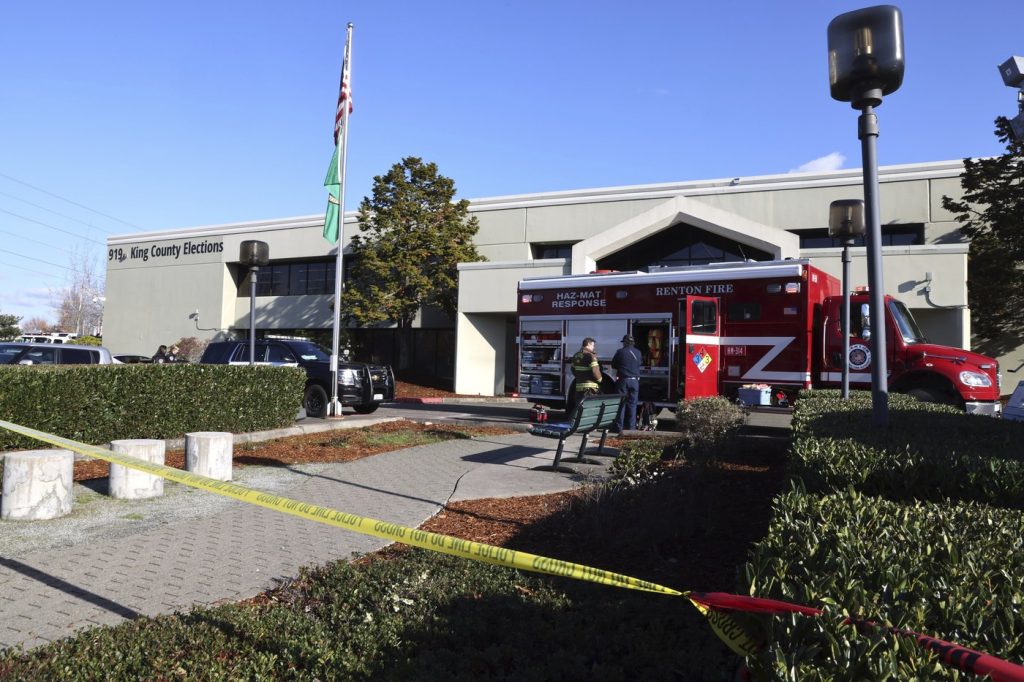NEW YORK (AP) - A suspicious video circulated on social media last October, showing ballots being ripped up in Pennsylvania, drew immediate attention from federal agencies, who swiftly identified it as Russian disinformation. Following this incident, on Election Day in November, bomb threats to polling places across various states caused few disruptions to the voting process. These incidents highlighted the ongoing threats to election security in the United States, which have been a focus for federal agencies aimed at combating foreign influence.
However, the Trump administration's recent efforts have led to significant downsizing within federal agencies that oversee election security, raising concerns about potential vulnerabilities in upcoming elections. Former Department of Homeland Security cybersecurity chief Suzanne Spaulding expressed alarm over the simultaneous increase in adversarial threats and the reduction of U.S. defenses, stating, “Our adversaries are upping their game every day.”
Last week, Attorney General Pam Bondi announced the disbandment of an FBI task force responsible for investigating foreign influence operations aimed at U.S. elections. She also restricted enforcement actions against individuals failing to disclose lobbying activities on behalf of foreign governments, arguing these changes would prioritize more pressing issues and mitigate risks associated with prosecutorial discretion. This action aligns with broader cuts to the Cybersecurity and Infrastructure Security Agency (CISA), which has suffered layoffs impacting over 130 employees, raising further concerns about the loss of expertise in election security.
Moreover, recent decisions from CISA have put its election security initiatives on hold, pending a review of funding and staffing. The agency is also discontinuing its voluntary program that shared vital information about cyber defenses with state and local election officials. Larry Norden, an election expert, commented on the implications of these actions, suggesting they signal to foreign adversaries that securing U.S. elections is no longer a priority for the federal government: "I think we would be naive to think that the bad guys don’t get that message too."
Although elections in the U.S. are run by state and local governments, federal support significantly aids these bodies in defending against growing threats and coordinating security efforts. For instance, Los Angeles County Registrar Dean Logan noted that federal officials alerted him to threats aimed at his office on two occasions, underscoring the critical role of federal oversight in ensuring election security.
The disbandment of the FBI’s task force dedicated to investigating foreign influence campaigns is perceived as a considerable loss for future elections. Experts, including Darren Linvill from Clemson University, have emphasized the importance of specialized knowledge and resources that only the FBI can provide in this realm. The Democratic leaders of Senate and House committees overseeing election legislation have conveyed "grave concern" regarding recent developments and have called for clarification about their implications for election security.
During his presidency, Trump sought to curtail government tracking of online misinformation, equating it to censorship against conservatives. Despite signing legislation to create CISA in 2018, he later dismissed its director, Christopher Krebs, after Krebs asserted the security of the 2020 election results, which Trump claimed were fraudulent. In contrast, the Biden administration took a proactive stance towards monitoring foreign influence, frequently notifying the public about ongoing operations.
Trump appointed Tulsi Gabbard as the new director of national intelligence. However, her plans for the Foreign Malign Influence Center remain unclear as it is set to be re-evaluated after 2028. For now, the Justice Department continues to investigate election interference-related espionage. Nonetheless, the reduction of the dedicated task force may negatively impact response efficacy, as noted by David Salvo of the German Marshall Fund’s Alliance for Securing Democracy.
Some Republicans have lauded the disbandment of the task force, with Senator Chuck Grassley labeling it "highly politicized." The FBI, while confirming the task force's closure, declined further comments on personnel decisions. The overall future of CISA and its capabilities in safeguarding elections remains uncertain, particularly given criticisms from Trump's allies regarding its focus on COVID-19 misinformation and the 2020 election.
As federal efforts face restructuring, state officials like Washington Secretary of State Steve Hobbs are advocating for funding to ensure continued election security, expressing concerns about reliance on the federal framework. Arizona Secretary of State Adrian Fontes emphasized the necessity of CISA’s support in maintaining election integrity in his state.










